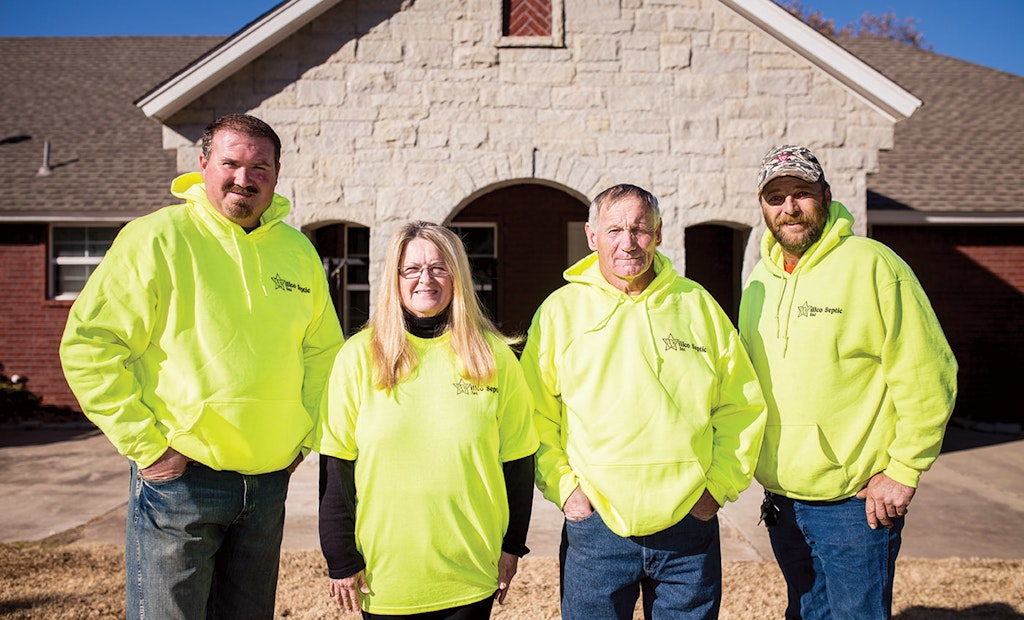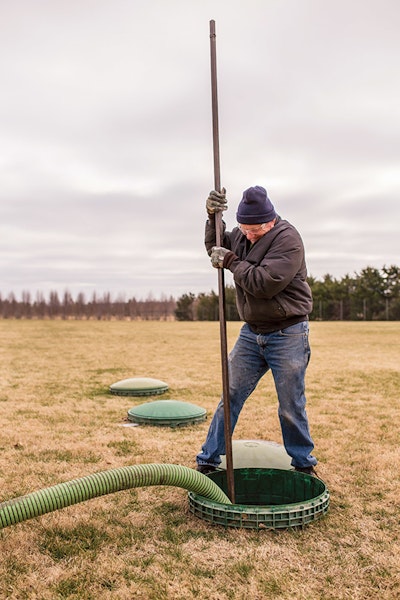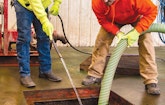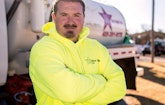
The Willco Septic crew includes, from left, Billy Williams, Shirley Williams, Raymond Smith and Nathan Chapman.
Billy Williams points to many factors in the growth of his company, Willco Septic, since its founding in 1997: Building a diverse array of services. Investments in quality equipment. Offering customers a five-year warranty on septic system installs. A 24- to 48-hour response-time guarantee.
But there’s another less tangible reason for the success of his business located in Choctaw, Oklahoma: He’s not afraid to admit when he’s made a business mistake, and then does something to fix it.
A good example is the company’s entry into septic system installations about eight years ago. Williams had considered doing installations for a long time. But for a young entrepreneur who avoids debt if at all possible to minimize overhead, the thought of investing in a backhoe and other equipment was daunting.
“I just wasn’t comfortable with spending that kind of money,” says Williams, 43. “Then I finally realized how much business we were losing — probably up to 100 installs a year. I was just putting money in someone else’s pocket. Had I been brave enough to make the jump, I could’ve done installs right away.”
About eight years ago, Williams bought a 2005 Case 580 Super M backhoe and an International 4700 truck and earned a state certification for installations. The initial investment? Roughly $50,000 — about $35,000 for the backhoe alone.
“But I paid off the backhoe pretty quickly,” he says. “When I look back now, I realize that not keeping installs in-house was a big mistake, especially because you also miss the opportunity to provide service work for those install customers. I probably would’ve been fine if I’d started doing installs right away … but you live and you learn.”
FOCUS ON AEROBIC SYSTEMS
Now Willco Septic does 80 to 90 system installations a year on average, most of them aerobic systems because the region’s soil contains high levels of clay. “Deciding to do installations was a game-changer for us,” he says.
For older homes that have a 1,000-gallon tank with a failing system, Williams installs an aerobic system behind the existing tank. “We save the 1,000-gallon tank. … It makes for a really good system,” he says. “It makes really good water.”
Aerobic systems provide opportunities for future service in the form of inspections; inspectors must be certified by the state of Oklahoma. During the first two years after the installation, Oklahoma regulations require an inspection every six months. The fees for those inspections are built into the installation price, Williams says.
During an inspection, Williams’ to-do list includes things like checking the sludge level in the tank, making sure there’s chlorine in the chlorinator, testing the water in the tank to make sure there’s enough chlorine in it, opening up the control box to make sure there’s no corrosion or broken wires and ensuring that the aerator works, Williams says.
After the initial two-year period expires, homeowners can pay $275 a year for two inspections, one every six months, or opt to do their own inspections. “A lot of homeowners do it themselves and only call us if they find something wrong,” Williams says.
A good marketing campaign helped build the installing business. Williams says installations jumped significantly when he hired a marketing company, BigWing, to redesign his website. “They specifically target people looking for aerobic septic system installations,” he explains. “Installations increased 50 to 75 percent since they started doing more targeted website advertising.”
STARTING SMALL
Judging from Williams’ success, there haven’t been too many missteps along the way since he started Willco, short for Williams’ company. He was familiar with the industry because his late grandfather, Orvil Irwin, ran a septic pumping company called Irwin Septic Tank Cleaning.
Williams started working for his grandfather at 10 or 12 years old. “I’d help him dig out trucks and get full of sand and dirt on weekends,” he recalls. “When I got older and worked for him during summers, he’d let me drag hoses around and uncover the tank (lid).”
When Williams graduated from high school, he tried several different jobs. But an opportunity arose when his grandfather started slowing down in his late 70s. No one in the family was ready to continue in the business, so he figured he should fill the void by starting his own company.
“So I saved up $10,000 and bought a 1989 Ford F-700 with a 1,300-gallon steel tank,” he reports. “I ordered the tank heads and had the tank barrel rolled by a company in Oklahoma City. My grandpa always built his own trucks, so he helped me build this one, too. I got into the business pretty cheaply with that truck, which was important because I didn’t have much money and didn’t want to go deep into debt.”
When his grandfather passed away, his grandmother kept active the Irwin Septic phone number and referred all customers to Williams. Between that, phone book advertising and word-of-mouth referrals, he slowly gained traction and built a business.
“When I started out, I didn’t have much overhead,” he says. “So if I did five to 10 tanks a week, I was fine — it didn’t take a whole lot of money to keep me going.” But as the company’s customer base grew, so did expenses. And when five to 10 tanks a week slowly morphed into five to 10 tanks a day, Williams knew he needed employees and more vacuum trucks. As such, he went from one to four service vehicles and one to four employees within the first five years.
EQUIPMENT LIST
Willco Septic currently runs four vacuum trucks. Mid-Continent Truck Sales built out two: one on a 2001 International 4300 chassis with a 2,500-gallon steel tank and a Masport pump and the other on a 2003 International 4400 chassis with a 2,300-gallon steel tank and a pump, manufactured by Elmira Machine Industries / Wallenstein Vacuum.
The other two trucks are a 2000 GMC 7500 with a 2,100-gallon steel tank and a Wallenstein pump built by Specialty B Sales and a 2000 Sterling 9500 built by 27th Trucks and carrying a 4,000-gallon steel tank and Masport pump.
In addition, the company owns a 2008 Chevrolet 2500 HD service truck, a 2005 Case 580SM backhoe, a 24-foot flatbed trailer made by Wild West Trailers, a 28-foot enclosed trailer built by Haulmark Trailers, a 1999 International 4700 flatbed service truck and a 2018 John Deere 35G mini-excavator.
For septic systems, Willco Septic buys concrete tanks and NuWater aerobic systems (made by Enviro-Flo) from RN Concrete Products. Williams prefers to use chambers made by Infiltrator Water Technologies and risers made by TUF-TITE and Polylok. Furthermore, the company uses a Clover point-of-sale credit-card processing system from Clover Network.
JUST SAY YES
Williams says part of his company’s success stems from his willingness to do jobs other companies won’t do. “We’ve built a reputation for taking on the tough jobs, like septic tanks that haven’t been pumped in 30 years,” he explains. “There are some really old houses around here with old-timers who just never pumped their tanks. … They say they didn’t know it was necessary.
“To clean tanks like that, we use reverse vacuum and backflush with water,” he continues. “You’ve got to run a lot of water. … For a 1,000-gallon tank, you might run 200 to 300 gallons of water. Sometimes it’ll take two or three hours to clean them — we run into that quite often.”
The upside from a business standpoint is that systems unmaintained for so long generally suffer from failing lateral lines. As a result, a pumping job can easily lead to a system installation. “They go hand in hand (pumping and installations),” Williams says. “We sell a lot of jobs out of the tank trucks.”
Williams also gives major credit to his mother, Shirley Williams, who answers the phones and generally keeps things running smoothly. She’s not only great with people on the phone, she is also very knowledgeable about septic systems and knows what questions to ask customers, Williams says.
“A little thing like that can make such a big difference,” Williams says. “If potential customers feel comfortable talking to someone on the phone, the odds are we’re going to be talking to them on their property later. My mom is probably one of the main reasons we’ve grown and retained customers as long as we have. She’s so good with people and can run the show when I’m gone.”
As many pumpers can attest, that’s no small matter. With three children, Williams is less interested in putting in megahours these days and more interested in carving out quality family time. “I don’t want to work nonstop every day — and we could easily work 24 hours a day, seven days a week,” he says. “I did that a lot early on because I had to hustle to get business. But now that we’re established, I can slow down a little bit. You need to spend time with your family.”
No more rapid growth
With that philosophy in mind, Williams isn’t interested in seeing Willco Septic get much bigger, because that would require taking on all the associated headaches that can come with further growth.
“We’re pretty happy where we are.” he says. “We now get to do things as a family that we probably couldn’t do if I worked for someone else. We’ve got two great guys on board (Nathan Chapman and Raymond Smith) who know what they’re doing, plus my mom, which gives us the opportunity to take time to go fishing and hunting and enjoy other outdoor activities as a family.”
The bottom line: Williams doesn’t regret deciding to enter the wastewater industry. “I’ve met a lot of great people over the years and they know us and our name and we’re respected around here,” he continues. “This has been a good business and I’m really happy I got into it.”
Standing behind your work
With nearly a dozen competitors within a 50-mile radius, Billy Williams — the owner of Willco Septic in Choctaw, Oklahoma — does everything he can to differentiate his company. That includes offering a five-year warranty on septic system installations and a 24- to 48-hour response-time guaranty.
“If we screw up something on an installation, we’ll fix it for free,” Williams says. “I’m confident enough in our labor and the materials we use to warranty our work. In fact, we’ve never had to go back to fix something since we started doing installs about eight years ago.”
Judging from Willco Septic’s ratings on Angie’s List (all A grades on 13 customer reviews), Home Advisor (51 reviewers gave the company an average score of 4.8 out of five possible total points), and Google (five-star ratings from three reviewers), it’s easy to see why Williams has no qualms about warranties.
Moreover, Willco Septic strives to provide same-day pumping service and guarantees no more than a 48-hour response time. Doesn’t that stretch the small crew to its limits? It does, he admits. “But we make do,” he says. “If a customer just can’t wait because it’s an emergency, we find a way to get there that day. I’ve been out at customers’ homes at 2 or 3 a.m.”
Providing that level of service demands great employees, and Williams says he has great ones in Nathan Chapman and Raymond Smith; they’ve been with the company for nine and 12 years, respectively. “They’re my right-hand guys,” he says. “They do anything they’re asked and go above and beyond for customers.
“For instance, this past weekend, we received an emergency call at 5 p.m.,” Williams notes. “So Raymond — who lives 25 miles away and was already at home relaxing — drove back to the shop and made another service call. That’s just what we do to keep customers happy.”









